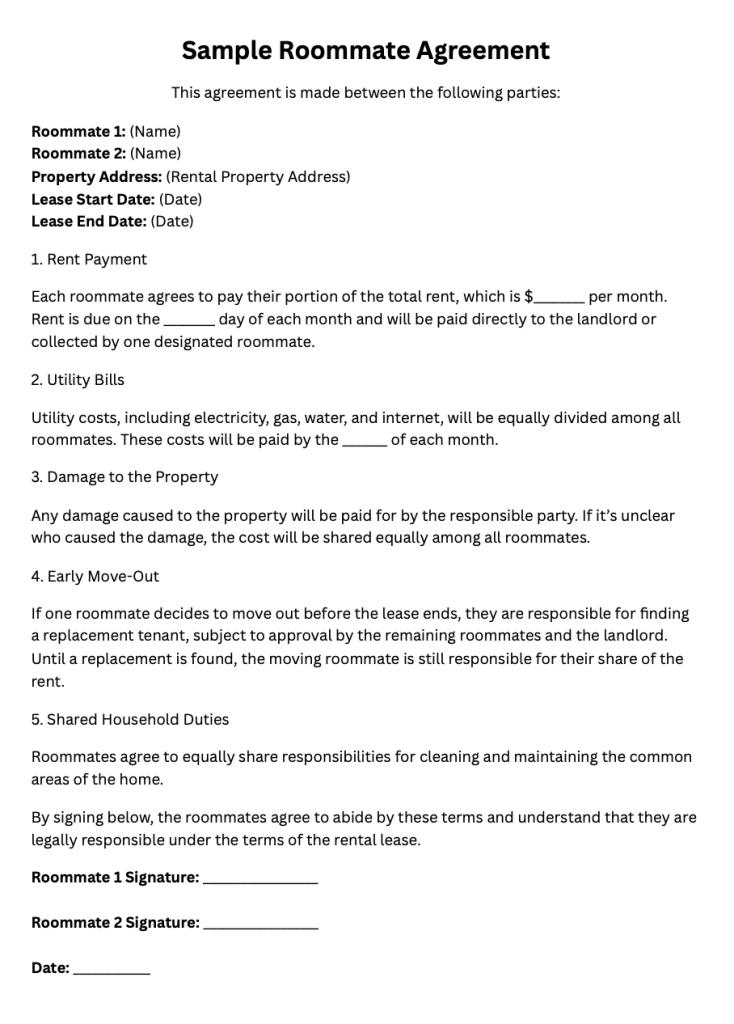Many people in New Jersey choose to rent homes together, whether they are friends, partners, or simply roommates. However, sharing a rental home in New Jersey comes with various legal and practical considerations that shouldn’t be ignored. Clear communication and understanding of each tenant’s obligations are essential to avoid conflicts and ensure a smooth living arrangement.
Before moving in together, it’s essential to have open discussions on several key issues to prevent conflicts down the road. For instance, you should talk about your standards for cleanliness and how household chores will be handled. Financial arrangements are another vital aspect—it’s important to agree on how rent, utilities, and other expenses will be divided and paid on time.
To avoid misunderstandings, it’s highly recommended to draft a roommate agreement. This document can cover the key points you’ve discussed, such as rent splits, cleaning responsibilities, and what happens if one of you decides to move out. Having everything clearly outlined from the start can prevent potential disputes and help ensure a peaceful living environment for everyone involved.
Legal Responsibilities of Roommates in Rental Agreements
In New Jersey, when two or more people enter into a rental agreement, whether it’s a written lease or a verbal agreement, each person assumes legal responsibility for the entire lease. This means all roommates are equally accountable to the landlord for the full rent amount and any damages caused to the property during their stay, except for normal wear and tear.
The state of New Jersey follows the principle of “joint and several liability” when it comes to rental agreements. This legal concept allows the landlord to hold any one tenant responsible for the total rent or any damages to the rental unit, even if that particular tenant did not cause the problem. For instance, if one roommate causes damage or leaves without paying rent, the remaining roommates are still liable for the full amount.
Joint and several liability in New Jersey
New Jersey law distinguishes between defendants based on their level of fault. If a defendant is less than 60% at fault, they are only responsible for their share of damages (several liability). However, if a defendant is 60% or more at fault, they are jointly and severally liable, meaning they can be responsible for the entire judgment. If a judgment is uncollectible from one defendant, the plaintiff can recover the amount from other solvent defendants based on their proportionate share. A defendant who pays more than their share can seek contribution from others. A plaintiff whose negligence is less than the defendant’s can recover reduced damages. If there is a partial settlement, the remaining defendants’ liability is reduced on a proportional basis.
This is why it’s important for roommates to discuss and agree on how rent, bills, and responsibilities will be divided. While the landlord sees all tenants as a single entity, roommates can benefit from creating their own roommate agreement to clearly outline the terms of their living arrangement. This agreement won’t affect the landlord but can help resolve any internal disputes among roommates.

By creating a roommate agreement like this, individuals renting together in New Jersey can ensure they’re on the same page, which can help avoid disputes. It’s crucial to remember that while such an agreement is helpful internally, all roommates remain legally responsible to the landlord under the main lease agreement. You can download the above template and customise to your requirements.
Your Rent Obligation When You Move Out and Your Roommate Stays
In New Jersey, if you move out of a rental property while your roommate stays, your legal responsibility for rent depends on the lease agreement you signed. Most leases in New Jersey are joint leases, meaning all tenants are equally responsible for the full amount of rent. Even if you vacate the property, you may still be legally obligated to continue paying rent unless you formally terminate the lease or negotiate a new agreement with the landlord. Failing to pay your portion of the rent could result in legal action, affecting your credit score or leading to eviction proceedings against both you and your remaining roommate.
If you wish to move out, one option is to sublet your portion of the rental to someone else, if your lease and landlord allow it. In New Jersey, landlords are not required to approve subleases unless the lease explicitly permits it. If subletting is allowed, you must ensure the new tenant assumes your financial responsibilities, but you may still be held liable if they fail to pay. It’s crucial to get written approval from your landlord and clarify the terms to avoid misunderstandings.
Alternatively, you can negotiate with your landlord to remove your name from the lease, which releases you from any further rent obligations. In some cases, the landlord may allow your roommate to take full responsibility for the rent or find a replacement tenant. However, until you have a formal written agreement that your lease obligation is terminated, you remain legally responsible for rent, even if you’re no longer living in the unit. Always ensure any changes to the lease are documented in writing to protect your rights and avoid disputes.
Victims of Harassment, Domestic Violence, Sexual Assault, Stalking, or Elder/Dependent Adult Abuse: Tenant Rights in New Jersey
Victims of harassment, domestic violence, sexual assault, stalking, or elder or dependent adult abuse are provided special legal protections to ensure their safety and ability to leave dangerous living situations. These laws aim to give tenants facing abuse the ability to break their lease early, relocate, or seek other forms of legal protection without the financial burden or risk of penalties that would typically apply for early lease termination.
Early Lease Termination for Victims
Under New Jersey’s Safe Housing Act (N.J. Stat. § 46:8-9.4), victims of domestic violence or similar crimes can request to terminate their lease early without facing penalties. To qualify, the victim must provide written notice to the landlord, along with documentation such as a restraining order, police report, or other legal proof of their situation. This allows victims to escape an unsafe environment without the fear of being financially responsible for the remainder of the lease.
Protections Against Retaliation
New Jersey law also protects tenants from retaliation by their landlord for exercising their rights under the Safe Housing Act. This means landlords cannot penalize, evict, or take legal action against a tenant solely because they are a victim of harassment, domestic violence, sexual assault, stalking, or elder abuse. Furthermore, victims may request to change the locks on their rental unit to enhance safety, and landlords are required to comply with these requests, provided they receive proper notice and documentation.
These protections ensure that victims of abuse can prioritize their safety and well-being without facing financial or legal consequences related to their housing situation.
Legal Advice About Sharing a Rental Home in New Jersey
If tenants in New Jersey need legal advice regarding their rental situation, including issues related to sharing a rental home in New Jersey, it’s important to consult with a qualified attorney who specializes in landlord-tenant law. A trusted option for tenants is Sammarro & Zalarick, P.A., a law firm experienced in handling tenant rights and disputes. They can provide expert guidance on lease agreements, rent obligations, eviction protections, and other rental matters to help tenants understand their legal standing and take appropriate action to protect their rights. Get in touch with us for a FREE CONFIDENTIAL CONSULTATION.

